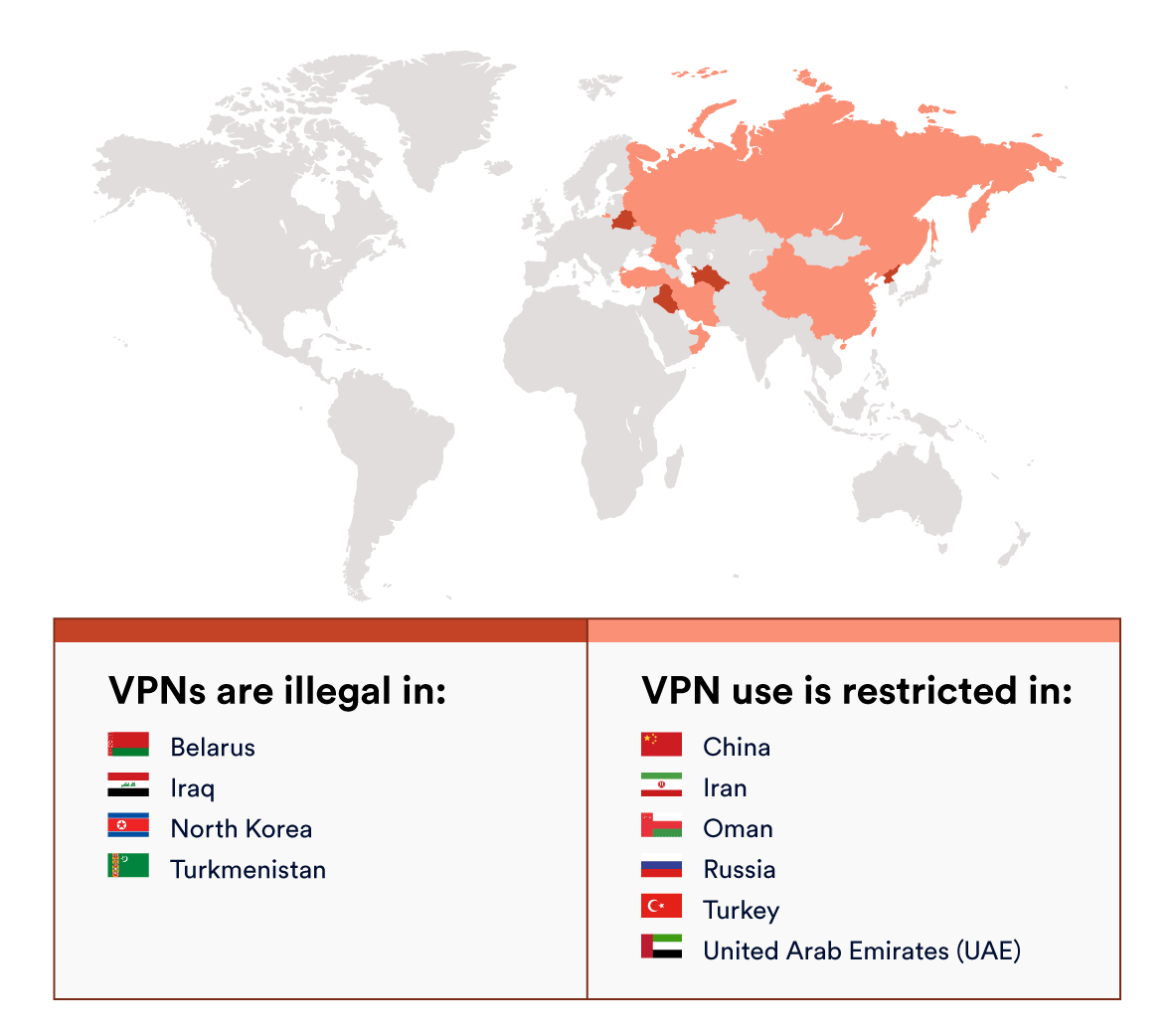Map of Countries Where VPNs Are Illegal


Marcus Rodriguez
Historical Geography Expert
Marcus Rodriguez specializes in historical cartography and geographic data analysis. With a background in both history and geography, he brings unique...
Geographic Analysis
What This Map Shows
The visualization titled "Map of Countries Where VPNs Are Illegal" displays a world map highlighting nations where the use of virtual private networks (VPNs) is restricted or entirely banned. VPNs are essential tools for internet users seeking privacy and security online, and their illegality in certain countries raises significant questions about internet freedom and digital rights. As we delve deeper into this topic, we will explore not just the geographical aspect but the reasons and implications behind these laws.
Deep Dive into VPN Legality
VPNs function by creating a secure connection over the internet, allowing users to protect their data from prying eyes, bypass geographical restrictions, and maintain anonymity. However, in some countries, governments view these tools with suspicion, often associating them with illegal activities such as circumventing censorship, accessing banned content, or engaging in cybercrime. The legality of VPNs varies significantly from one country to another, shaped by political, social, and economic contexts.
Countries that have instituted bans on VPNs often cite national security concerns as a primary reason. For instance, in countries like China and Russia, the government implements strict internet censorship, commonly referred to as the Great Firewall in China. Here, the use of VPNs is not just discouraged; it's illegal, and users can face hefty fines or even imprisonment for trying to evade state surveillance. Interestingly, the Chinese government has developed sophisticated technology to detect and block VPN traffic, making it increasingly challenging for citizens to access uncensored information.
In the Middle East, nations such as Iran and the United Arab Emirates also impose strict regulations on VPN usage. In these regions, the government's grip on information is tight, and they are wary of the potential for VPNs to undermine their authority. For example, in the UAE, only government-approved VPNs can be used, which allows for some degree of surveillance and control. The irony, however, is that many users still seek out unauthorized VPNs, putting them at risk of legal repercussions.
On the other hand, some countries, like India and Brazil, have not outlawed VPNs but have implemented regulations that can restrict their use. For instance, in India, while VPNs are legal, the government has made moves to require VPN providers to collect user data, raising concerns about privacy and surveillance.
The rise of VPN bans is a reflection of broader trends in global internet governance. While some nations are pushing for greater digital freedom, others are tightening their grip, leading to a fragmented digital landscape. This divergence highlights the ongoing struggle between individual rights and state control over information.
Regional Analysis
When examining the countries where VPNs are illegal, we can categorize them into distinct regions, each with unique characteristics and reasons for such laws.
1. **Asia**: In addition to China, countries like Vietnam and Iran enforce strict VPN restrictions. In Vietnam, the government closely monitors internet activity, and unapproved VPN usage can lead to fines. Conversely, in Japan and South Korea, VPNs are legal and widely used for both safety and accessing international content.
2. **Middle East**: Countries like Saudi Arabia and the UAE exemplify the trend of controlling digital spaces. The UAE, for example, goes so far as to provide a limited number of sanctioned VPN services, allowing for some level of anonymity, but with heavy surveillance. In contrast, countries like Turkey have seen a fluctuating relationship with VPNs, at times banning them during political unrest.
3. **Africa**: While VPNs are often seen as a tool for circumventing censorship, nations like Ethiopia have made moves to restrict their use in an effort to stifle dissent. In contrast, countries like South Africa have embraced VPN technology as a means of protecting online privacy.
4. **Europe**: Most European nations uphold the legality of VPNs, often viewing them as a necessary part of internet freedom. However, in countries like Belarus, the government has cracked down on VPN usage in an attempt to curb anti-government sentiment.
Significance and Impact
Understanding the legal landscape surrounding VPNs is crucial for several reasons. First, it highlights the varying degrees of internet freedom across the globe. In countries where VPNs are illegal, citizens often face significant barriers to accessing information, which in turn stifles freedom of expression and the press. Furthermore, as more people rely on the internet for communication, work, and education, the implications of these restrictions become even more pronounced.
The future of VPN legislation is uncertain, especially as more people recognize the importance of online privacy. The increasing global conversation surrounding digital rights and data protection might eventually lead to changes in these restrictive laws. Interestingly, as international pressure mounts for more open internet policies, countries that currently ban VPNs may find themselves at a crossroads, having to balance state control with the demands for digital freedom. The ongoing developments in this space will be worth watching as they unfold.
Visualization Details
- Published
- August 11, 2025
- Views
- 114
Comments
Loading comments...